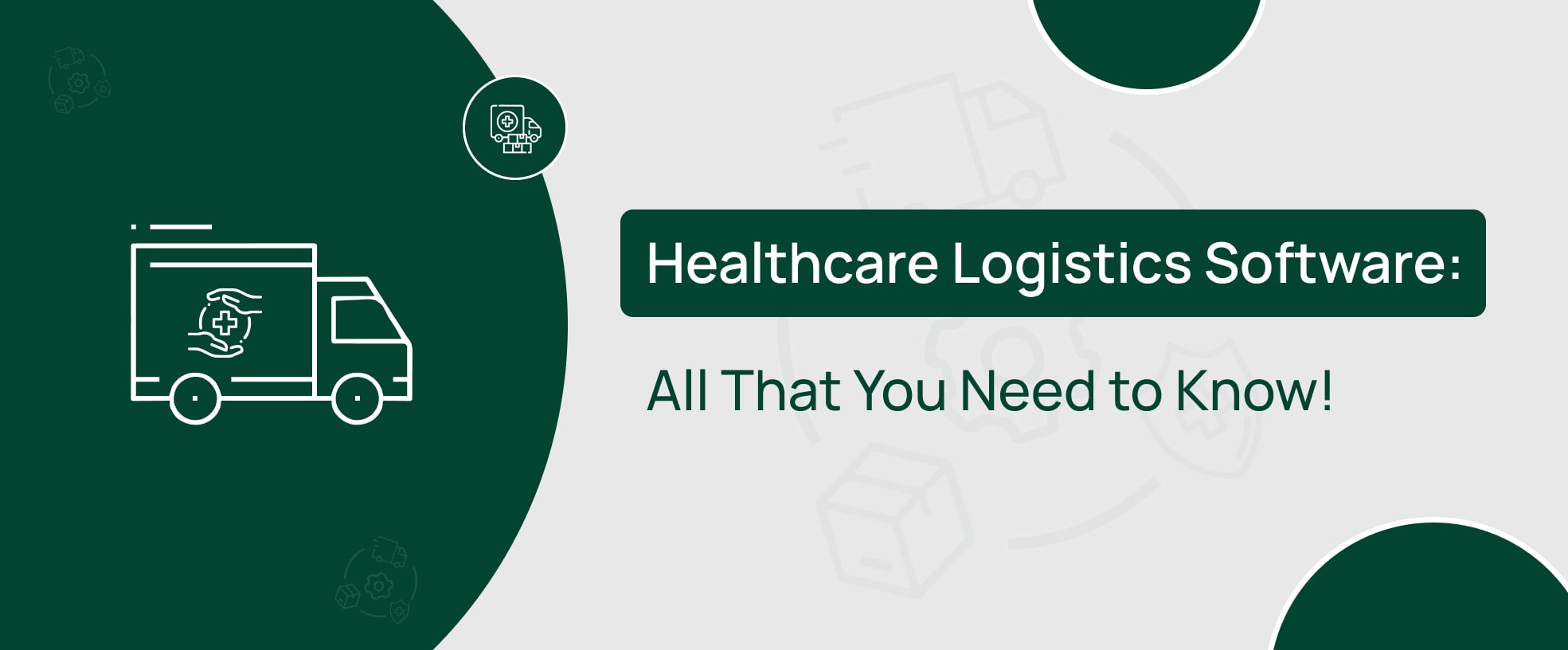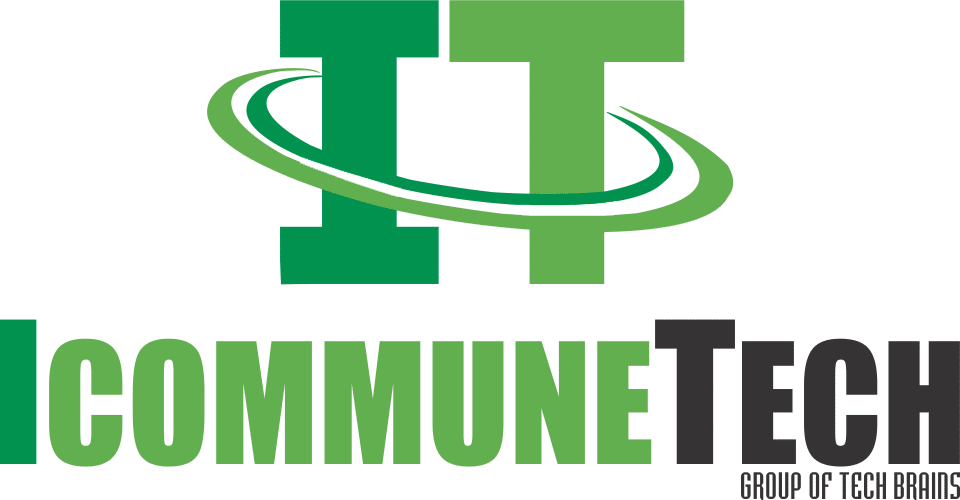Healthcare Logistics Software: All That You Need to Know!

Healthcare Logistics Software:
Where supply chains are healed, and lifelines are delivered!
Why Logistics Software for Healthcare is A Must-Have?
Logistics Software for healthcare is a boon in several ways. Medical supplies are temperature and weather sensitive. Also, timely delivery here is more important than in any other industry as there are supplies like life-saving organs, blood and lab specimens etc. Hence a tailor-made software that can manage the inventory, transportation and temperature-sensitive deliveries on time is very important.
Here is the complete guide on everything you want to know about logistics software for healthcare.
What is Healthcare Logistics?
Healthcare Logistics is managing and monitoring the devices, medical supplies and pharmaceutical equipment right from the production units to the different points where they are needed and eventually to the patients.
Check out what is logistics management software to explore the overview in detail.
Why is Logistics Software For Healthcare Preferred Over The Generic One?
Healthcare is one of the most sensitive industries. Generic software cannot fulfill the special requirements of the healthcare industry. There cannot be one size fit for all. As medical supplies have their set of special challenges and complexities, a generic software is not recommended.
Here are the reasons why healthcare logistics software is irreplaceable:
Unique Regulatory Healthcare Requirements:
Healthcare logistics have to comply with stringent rules and regulations. Privacy of the sensitive data is to be protected as well. Apart from this, weather sensitive supplies have to be handled very carefully. So, generic software cannot address the special healthcare needs.
Logistics Software for Healthcare is designed to ensure compliance with the GDP and HIPAA.
Specialized Features For Hazardous Products:
Healthcare logistics has unique processes, like managing hazardous materials. Generic software does not have specific features for efficiently managing these products.
Healthcare-specific software is carefully designed to meet the industry’s unique needs. Tools for sensitive inventory monitoring and management and route tracking are available for the healthcare sector.
Integration with the Unique Healthcare Needs is Difficult:
The modern healthcare industry depends on EHRs or Electronic Health Records. Unlike specialized healthcare logistics software, Generic Logistics Software cannot integrate with these unique systems.
The healthcare supply chain is critical because it saves lives; hence, generic software is not recommended. Check out the other industries that need industry-specific logistics software only.
Logistics Software For Healthcare – 3 Main Arms:
First Mile:
The supply chain for healthcare is highly complex. According to a report by McKinsey, it can start in Asia and circumnavigate the entire world twice, which can only imagine its complexity. The first-mile players entail large pharmaceutical companies and medical equipment manufacturers.
Second Mile:
When an order is placed with the drug manufacturers (production units), the products are shipped to the distribution centers, which in turn ship them to the clinics. Transportation of the products from the manufacturing point to the distribution centers and the healthcare units is the middle mile.
The Last Mile:
The all-mile or last mile in the supply chain is the patients to whom drugs and other healthcare products are to be delivered. Ever since the pandemic struck, supply chain management in healthcare has become more popular than ever.
A Few Examples That Integrated Healthcare Logistics Software To See Their Profits Soar
- QVIA institute for Human Data Science incurred a total loss in their industry to be around $35 billion yearly because they could not handle temperature sensitive shipments. [1]
- Tri-venture Logistics LLC, a leading medical Logistics supplier, partnered with Tecsys to implement warehouse management and saw their growth and profits soar. [2]
- John Muir Health integrated its healthcare system with Workday’s Logistics, and ever since then, its supply chain and financial operations have been streamlined. [3]
- Maidstone and Tunbridge Wells NHS Trust 2020 partnered with Tele-tracking software to manage patients’ flow and bed availability. This results in yearly savings of 2.1 million pounds. [4]
Importance of Logistics Software For Healthcare
It is very important for patients to receive the right healthcare at the right time. Healthcare supply chain software helps patients in several ways. With it, they can receive the required medical supplies and treatments on time.
Real-time Tracking and Visibility:
With its real-time tracking feature, the software manages the inventory and reduces the chances of a shortage of life-saving supplies. No risks can be taken when it comes to delivering time—and temperature-sensitive supplies. Whether they are radiopharmaceuticals or any organs, delays are not an option.
With the real-time tracking feature of Logistics Software for Healthcare, driver progress and deliveries can be monitored every 2 minutes. Thus, life-saving supplies can be delivered without compromise.
Data-Driven Insights For a Better Efficiency:
Tracking is not the only benefit offered by the Logistics Software for Healthcare. It collects data that helps the delivery team locate even the smallest inefficiency. Unexpected circumstances on the route, traffic jams, and other hassles can occur.
With the help of data driven by the software, The delivery performance can be improved to a great extent. With the help of analytics, demand forecasting can be made so there are no shortages or oversupplies.
Building Bonds of Loyalty:
Whatever the industry, transparency is needed for customer loyalty. Tracking technology and real-time visibility build a bridge of trust between vendors and customers. Regular customer notifications help ensure that all vulnerable products are in safe hands.
The specialized software complies with the medical HIPAA (Health Insurance Portability and Accountability) standards.
In short, you can expect a higher level of efficiency, transparency, better automation, precision, and much more. This ensures that medical emergencies are met on time.
Check out the Benefits of LMS, and the Features of LMS for more understanding of why LMS is a must for your business!
Past and Present of Medical Healthcare Supply Chain Management:
Until the 1980s, the logistics of healthcare units were manually run and decentralized. Each hospital and healthcare unit was run manually, and hence, it was error-prone. Back then, there was either paper/pen or only limited digital forms. In short, healthcare supply logistics had limited options only.
Hospitals and healthcare units had to physically reach the vendors. Warehouses and other inventories were also manually managed. There was no forecast of demands, and the whole inventory was at risk of errors. There was a likelihood of either oversupply or eventual waste.
The whole scenario has changed now. Supply chains are more evolved and centralized now. Concepts like IDS or Integrated Delivery Systems have assisted hospitals in gaining far better visibility.
Useful data insights and analytics have helped in inventory management, reducing wastage. Also, all the manual tasks are fully automated, leading to more precision and efficiency.
Healthcare Logistics Software: What Does the Future Hold?
With trends like AI and Blockchain, healthcare logistics is all set for continual growth. The entire healthcare industry is fast evolving, and so is the Logistics Software tailored to its needs. Here are a few future trends in healthcare logistics software.
#1 – Artificial Intelligence-Led Decision-Making:
AI will play a key role in predicting the demand, optimizing routes, and ensuring that the inventory levels are well-balanced. With trends like AI and Blockchain, healthcare logistics is all set for continual growth. The entire healthcare industry is fast evolving, and so is the Logistics Software tailored to its needs. Here are a few future trends in healthcare logistics software.
#2 – Machine learning Algorithms:
AI is going to play a key role in predicting demand, optimizing routes, and ensuring that inventory levels are well-balanced. This will help in route planning, precision in delivery schedules, and reduced wastage of medical supplies.
#3 – Blockchain Enhances Transparency:
Blockchain technology is all set to revolutionize the healthcare supply chain. It would maintain the integrity of medical supplies, whether pharmaceuticals or organ transplantation. You will be able to get complete tamper-proof records for the inventory and fleet, etc.
#4 – Integration of IoT:
The Internet of Things is a technology that can significantly improve logistics software for healthcare. Whether it is real-time tracking of medical supplies or monitoring temperature or weather-sensitive products, IoT will ease all this.
#5 – Enhanced Level of Automation:
RPA, or Robotic Process Automation, can streamline all the possible repetitive tasks, such as shipment tracking, order processing, etc. Drones and AGVs, Automated Guided Vehicles, can handle essential deliveries quickly during emergencies.
#6 – Personalized Patient Logistics:
Personalized patient logistics will be another trend in healthcare logistics. Whether it is about delivering customized packages or any other specialized medical supply, personalized patient logistics will be very helpful.
#7 – Data Analytics for Predictive Insights:
Advanced analytics will provide predictive insights into logistics performance, helping healthcare providers anticipate challenges, minimize delays, and enhance operational efficiency.
Apart from that, a more sustainable future of supply chain logistics management is foreseen with AI and blockchain technology.
The concept of healthcare logistics is now clear, but still don’t know what will be more suitable for your business? Then check out Cloud vs. On-Premise Logistics Solutions to decide which one will be the best pick for you!
Conclusion
Logistics Software for healthcare is not just a technology to streamline logistics operations; it is more like an asset. It has a direct influence on patients’ healthcare, cost management, and regulatory compliance, too.
The future of healthcare logistics, like AI, IoT, and blockchain, will transform the entire medical supply chain for a better progression.
If your industry is healthcare, do not think twice. It is not just about prioritizing efficiency, accuracy, and cost-savings. Do not let the healthcare challenges of tomorrow hamper the process of inventory, transportation, and delivery. Act smart as life saviors and act today!
Let us schedule a meeting to demonstrate how our CommuteLogix will transform your industry today, tomorrow, and always.
Irshad Pathan

Web Development Expert
Irshad is a senior technical expert at iCommuneTech. He manages the iCommuneTech's Web Development Team, and has hands-on expertise in web development, Laravel development, Logistics, fleet management, and Supply Chain Management. He mentors the in-house team and enjoys describing his experience in words.
